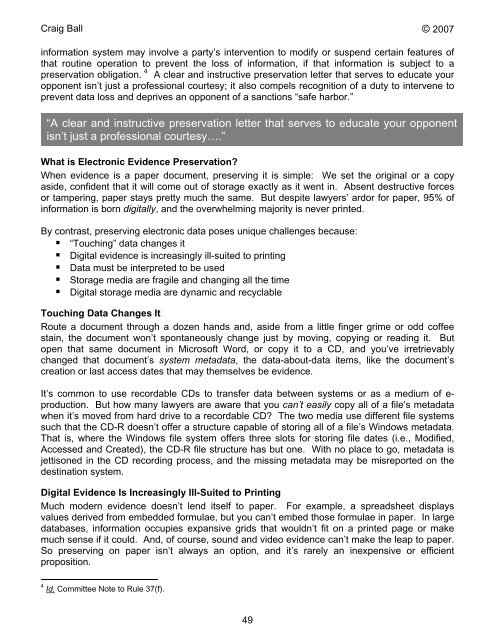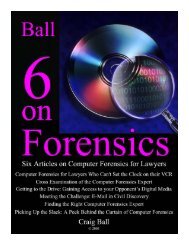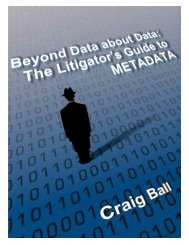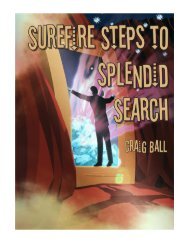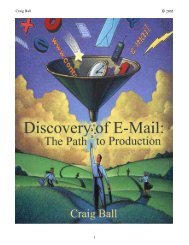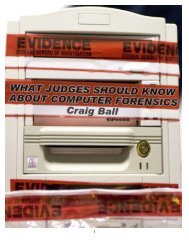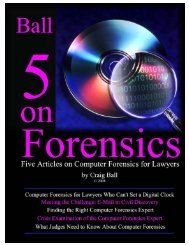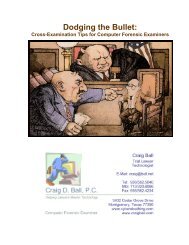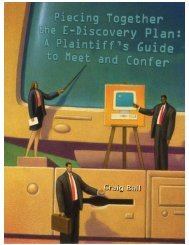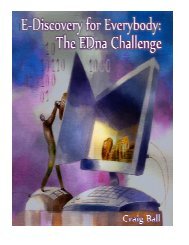Six Articles on Electronic - Craig Ball
Six Articles on Electronic - Craig Ball
Six Articles on Electronic - Craig Ball
You also want an ePaper? Increase the reach of your titles
YUMPU automatically turns print PDFs into web optimized ePapers that Google loves.
<strong>Craig</strong> <strong>Ball</strong> © 2007<br />
informati<strong>on</strong> system may involve a party’s interventi<strong>on</strong> to modify or suspend certain features of<br />
that routine operati<strong>on</strong> to prevent the loss of informati<strong>on</strong>, if that informati<strong>on</strong> is subject to a<br />
preservati<strong>on</strong> obligati<strong>on</strong>. 4 A clear and instructive preservati<strong>on</strong> letter that serves to educate your<br />
opp<strong>on</strong>ent isn’t just a professi<strong>on</strong>al courtesy; it also compels recogniti<strong>on</strong> of a duty to intervene to<br />
prevent data loss and deprives an opp<strong>on</strong>ent of a sancti<strong>on</strong>s “safe harbor.”<br />
“A clear and instructive preservati<strong>on</strong> letter that serves to educate your opp<strong>on</strong>ent<br />
isn’t just a professi<strong>on</strong>al courtesy….”<br />
What is Electr<strong>on</strong>ic Evidence Preservati<strong>on</strong>?<br />
When evidence is a paper document, preserving it is simple: We set the original or a copy<br />
aside, c<strong>on</strong>fident that it will come out of storage exactly as it went in. Absent destructive forces<br />
or tampering, paper stays pretty much the same. But despite lawyers’ ardor for paper, 95% of<br />
informati<strong>on</strong> is born digitally, and the overwhelming majority is never printed.<br />
By c<strong>on</strong>trast, preserving electr<strong>on</strong>ic data poses unique challenges because:<br />
• “Touching” data changes it<br />
• Digital evidence is increasingly ill-suited to printing<br />
• Data must be interpreted to be used<br />
• Storage media are fragile and changing all the time<br />
• Digital storage media are dynamic and recyclable<br />
Touching Data Changes It<br />
Route a document through a dozen hands and, aside from a little finger grime or odd coffee<br />
stain, the document w<strong>on</strong>’t sp<strong>on</strong>taneously change just by moving, copying or reading it. But<br />
open that same document in Microsoft Word, or copy it to a CD, and you’ve irretrievably<br />
changed that document’s system metadata, the data-about-data items, like the document’s<br />
creati<strong>on</strong> or last access dates that may themselves be evidence.<br />
It’s comm<strong>on</strong> to use recordable CDs to transfer data between systems or as a medium of e-<br />
producti<strong>on</strong>. But how many lawyers are aware that you can’t easily copy all of a file’s metadata<br />
when it’s moved from hard drive to a recordable CD? The two media use different file systems<br />
such that the CD-R doesn’t offer a structure capable of storing all of a file’s Windows metadata.<br />
That is, where the Windows file system offers three slots for storing file dates (i.e., Modified,<br />
Accessed and Created), the CD-R file structure has but <strong>on</strong>e. With no place to go, metadata is<br />
jettis<strong>on</strong>ed in the CD recording process, and the missing metadata may be misreported <strong>on</strong> the<br />
destinati<strong>on</strong> system.<br />
Digital Evidence Is Increasingly Ill-Suited to Printing<br />
Much modern evidence doesn’t lend itself to paper. For example, a spreadsheet displays<br />
values derived from embedded formulae, but you can’t embed those formulae in paper. In large<br />
databases, informati<strong>on</strong> occupies expansive grids that wouldn’t fit <strong>on</strong> a printed page or make<br />
much sense if it could. And, of course, sound and video evidence can’t make the leap to paper.<br />
So preserving <strong>on</strong> paper isn’t always an opti<strong>on</strong>, and it’s rarely an inexpensive or efficient<br />
propositi<strong>on</strong>.<br />
4 Id. Committee Note to Rule 37(f).<br />
49


